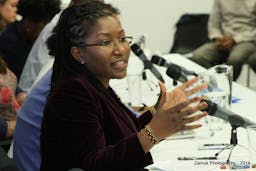Diaspora – the missing link in development?
May 28, 2019
Story

Check out my latest IDSblog:
As a founder and CEO of a diaspora led non-profit organisation,Diaspora for African Development (DfAD), I am an ardent supporter of the notion of the African Diaspora as a development actor. This concept has been slowly making its way into the mainstream development sector but the synergetic nexus between migration and development is yet to be harnessed by the majority of African countries.
Moreover, given the potential contribution that the Diaspora can make towards achieving the Sustainable Development Goals (SDGs), traditional development institutions now need to do away with tokenism and allow the Diaspora movement to flourish.
The connotations of the term ‘diaspora’ have evolved over time. It refers to a group of people dispersed (voluntarily or forcibly) from their area of origin, who continue to share some sense of common identity, and ongoing links to their home country. Mounting evidence indicates that, leveraged by the right policies, these migrants and diaspora communities can significantly contribute to development in both origin and destination countries.
However, as argued by Oliver Bakewell in his 2007 paper,‘Keeping Them in Their Place: the ambivalent relationship between development and migration in Africa’(pdf), consideration has to be given to not only how migration contributes to hitting (or missing) development targets, but also how it actually changes the nature of these targets. His paper further argues that, the very notion of development, as understood and applied by the ‘mainstream’ of development ‘professionals’ (both practitioners and academics), has a sedentary bias. This approach, by implication, tends to view development as a remedy against migration even though such conventional understandings of migration and human development are challenged by empirical evidence pointing at the generally positive associations between levels of human development and mobility.
Hence, such views have resulted in making migration and development uncomfortable bedfellows in many circles despite the new-found widespread enthusiasm for their cohabitation. The ‘Diaspora Development Movement’ therefore continues to struggle to reach its full catalytic potential as, more often than not, the African Diaspora are left to bear the burden of proof of its value as development actors in this nexus between migration and development. This dichotomy has not been helped by the lack of data around the impact of diaspora engagement and activities.
Diaspora Engagement Framework Policy
In my own country of origin, Zambia, for example, Diaspora engagement is far behind the advances that have been made by other African countries like Ghana, Ethiopia, Nigeria and Kenya. However, a recent announcement in the media stating that the Zambian Government are set to formulate theDiaspora Engagement Framework Policyby the third quarter of 2015 gives us hope. As DfAD we have put a lot of effort in to raising awareness for the need for this policy, and we are keen to support this process through to fruition. Our only concern is whether there is enough political will to sustain this new momentum. The Zambian Diaspora will need to actively engage in this policy formulation process. They are the missing link. Therefore, as the Ministry of Foreign Affairs in Zambia works with the International Organization for Migration (IOM) Zambia to raise resources to finalise the development of the policy, our own prodigious efforts are required now, more than ever, to ensure that Government maintains this momentum.
Subsequently, DfAD has submitted a proposal to the Zambia High Commission in the UK offering the Zambian Government assistance with running the community consultation process in London. DfAD believes that, despite limited resources, we as the diaspora need to make direct efforts to engage the Government if this current ‘political will’ and momentum are to bear tangible fruit.
Involvement in the post-2015 process
Furthermore, given that 2015 is a critical year for international development, it is vital that African Diaspora have opportunities to engage in the broader post 2015 development conversations. As most Diaspora organisations have strategically positioned themselves to facilitate the process of transnational activities and networks and to act as development bridge-builders between the host and home countries, this year organisations such as DfAD have an opportune chance to disseminate the significant impact that the post 2015 sustainable development goals processes will have on the continent for the next 15 years.
DfAD is hoping to hold a conference as part of the European Year of Development targeted at the Southern African diaspora communities in the UK, an under-represented voice in the international development arena. The proposed conference will provide Southern African diaspora communities in the UK with an opportunity to engage in development focused dialogue that will enhance their understanding of the post 2015 process and EU development cooperation. In addition, the event is designed to create a space for sharing best practice and new innovative ways of working that will promote a Southern African diaspora regional focused dialogue, thus enabling the formulation of diaspora-led Southern African regional focused solutions in advancing the Post 2015 Sustainable Development Goals (SDGs) agenda.
The conference is also set to launch a DfAD led ‘Southern African Diaspora Communities International Development Forum (SADCidf)’ to enable continued dialogue beyond the conference. SADCidf is a significant way forward in DfAD’s development efforts.
Understanding the contribution of diaspora to development
The January 2014 African Diaspora Policy Centre (ADPC) report, Diaspora Organisations as Strategic Agents of Development, concluded with a call for further investigation and analysis of the potential of African diaspora and their contribution to development. I think this is absolutely essential as it will deepen understanding and provide critical lessons on what works and how diaspora can continue to shape and implement development interventions in the future.




